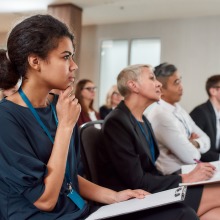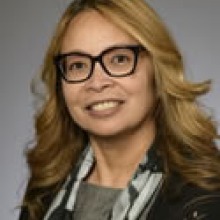Continuing Education & Outreach
The College offers continuing education and training for professionals, community outreach through health fairs and education, and special programs to engage and inspire youth.
HOPE Center Training Programs

The HOPE Center is a premier source of training and education for health outcomes and pharmacoeconomic research. The center’s faculty has expertise in developing and conducting educational conferences and interactive training session programs.
Training Programs For Communities and Professionals
The Arizona Poison and Drug Information Center was one of the very first such centers in the country. The center got started all because of a caring faculty member at the College of Pharmacy in the 1950s. Today the Arizona Poison and Drug Information Center serves 14 of the state's 15 counties and helps people who are worried about poison, medicines and bites and stings from venomous creatures. The certified specialists answer about 100 calls per day. The center works to keep Arizonans healthy and safe and provide expert medical knowledge they need when they have a poison emergency.
They are able to provide health care, educate others, conduct medical research, save lives, and reduce costs. The center provides the following outreach services:
- Presentations at a variety of locations including community organizations, businesses, senior citizens' groups and professional conferences
- Presentations with live venomous creatures of Arizona: rattlesnakes, Gila monsters and scorpions
- Exhibits at health fairs and other events
- Educational materials including brochures, magnets, telephone labels
- Educational programs in poison prevention
- "Train the Presenter" poison prevention programs for teachers and health care professionals
Learn more about the Arizona Poison & Drug Information Center
Throughout pharmacy school, PharmD students at the college participate in a wide range of health education events, disease screenings, charity events and community service activities. Each year they provide free services to thousands of Arizonans.
In many cases, the projects and events are sponsored by one of the student organizations at the College of Pharmacy. Other times, students take part in large events or projects - the Susan G. Koman Race for the Cure or Ronald McDonald House, for example - sponsored by national organizations.
The Arizona Laboratory for Emerging Contaminants (ALEC) is located at the University of Arizona to assist faculty, student and staff researchers working in the field of water sustainability to detect, quantify and speciate organic and inorganic micro-pollutants – including dissolved and nano-particulate components - in complex environmental matrices.
The laboratory utilizes state-of-the-art mass spectrometry and associated analytical techniques to study a variety of samples. Training is available on instruments in the lab. The laboratory facility is dedicated to providing state-of-the-art analyses of organic and inorganic micro-pollutants to faculty, staff and students engaged in water sustainability research. Our intent is to develop novel analytical and bioanalytical (e.g. in vitro) methods for effective detection, quantification, and measurement of biological effects of trace contaminants in real-world matrices, and to apply these methods to the diversity of sample types being investigated by researchers at Arizona's three state universities.
Training Programs For Youth Through College-Age Students
Since 1997, Math Engineering Science Achievement (MESA) has partnered with the College of Pharmacy to provide middle school youth with a week-long camp designed to inspire youth to pursue careers in Pharmacy or other Health Sciences. The one-week long summer program introduces students to different health professions and helps them learn more about the roles pharmacists play in clinics, community pharmacies, hospitals and other locations. Usually, the college collaborates with one or more school districts to select the "campers." In recent years, the program expanded to include camps in Yuma, Phoenix, Casa Grande, Nogales and Sierra Vista, as well the traditional Tucson event.
SWEHSC promotes training of graduate students and new investigators into the area of environmental health sciences. There are opportunities for young scientists to mentor senior high school students and undergraduates. Our Cellular Imaging, Genomics, Proteomics and Integrative Health Sciences Facility Cores provide investigators and their laboratories with access to state-of-the-art instrumentation and technical expertise to advance their research endeavors.
Keep Engaging Youth in Science (KEYS) is a unique summer opportunity for motivated Arizona high school students with a strong interest in bioscience, engineering, environmental health, or biostatistics to work side-by-side with top faculty in University of Arizona laboratories. Through the Southwest Environmental Health Sciences Center (SWEHSC), the College of Pharmacy is a co-sponsor with BIO5 of the seven-week research internship.
After initially training in laboratory techniques and safety, interns will participate in innovative research projects under the guidance of UA faculty and other lab members, including current university students. Past interns have assisted in creating better ways to detect and treat diseases like Alzheimer’s, cancer, asthma, and diabetes; exploring the effect of contaminated water sources on populations and the environment; studying plants and animals to determine their impact on ecosystems, and analyzing the role genes play in individual human health. At the close of the program, KEYS interns present what they’ve learned and experienced to friends, family, and the academic community at a public research showcase.


